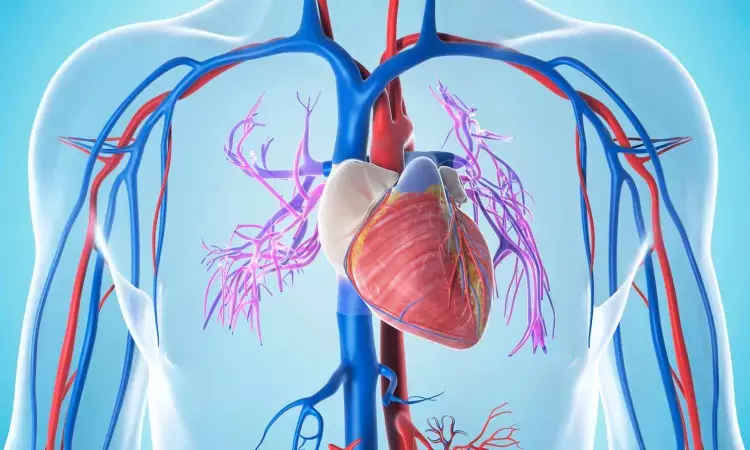- Home
- Medical news & Guidelines
- Anesthesiology
- Cardiology and CTVS
- Critical Care
- Dentistry
- Dermatology
- Diabetes and Endocrinology
- ENT
- Gastroenterology
- Medicine
- Nephrology
- Neurology
- Obstretics-Gynaecology
- Oncology
- Ophthalmology
- Orthopaedics
- Pediatrics-Neonatology
- Psychiatry
- Pulmonology
- Radiology
- Surgery
- Urology
- Laboratory Medicine
- Diet
- Nursing
- Paramedical
- Physiotherapy
- Health news
- Fact Check
- Bone Health Fact Check
- Brain Health Fact Check
- Cancer Related Fact Check
- Child Care Fact Check
- Dental and oral health fact check
- Diabetes and metabolic health fact check
- Diet and Nutrition Fact Check
- Eye and ENT Care Fact Check
- Fitness fact check
- Gut health fact check
- Heart health fact check
- Kidney health fact check
- Medical education fact check
- Men's health fact check
- Respiratory fact check
- Skin and hair care fact check
- Vaccine and Immunization fact check
- Women's health fact check
- AYUSH
- State News
- Andaman and Nicobar Islands
- Andhra Pradesh
- Arunachal Pradesh
- Assam
- Bihar
- Chandigarh
- Chattisgarh
- Dadra and Nagar Haveli
- Daman and Diu
- Delhi
- Goa
- Gujarat
- Haryana
- Himachal Pradesh
- Jammu & Kashmir
- Jharkhand
- Karnataka
- Kerala
- Ladakh
- Lakshadweep
- Madhya Pradesh
- Maharashtra
- Manipur
- Meghalaya
- Mizoram
- Nagaland
- Odisha
- Puducherry
- Punjab
- Rajasthan
- Sikkim
- Tamil Nadu
- Telangana
- Tripura
- Uttar Pradesh
- Uttrakhand
- West Bengal
- Medical Education
- Industry
Low PUFA intake may magnify risk of developing CVD among people with family history of heart disease

A recent study delving into the interplay between dietary intake of polyunsaturated fatty acids (PUFA) and family history in relation to cardiovascular disease (CVD) risk has uncovered a significant association. Researchers have found in a new study that Low PUFA intake may magnify risk of developing CVD among people with family history of heart disease.
This study was published in the Circulation journal by Laguzzi A. and colleagues.
Researchers examined data from over 40,000 adults, exploring the impact of low PUFA intake, particularly eicosapentaenoic/docosahexaenoic acids (EPA/DHA), in individuals with and without a family history of CVD. The study, conducted across a large consortium, assessed blood and tissue PUFA levels, categorizing PUFA levels ≤25th percentile as indicative of low intake of specific fatty acids. A family history of CVD was defined as having at least one first-degree relative who had experienced a CVD event.
The most striking finding revealed a significant interaction between low EPA/DHA intake and a family history of CVD. After meticulous adjustments for various influencing factors, the combined exposure to low EPA/DHA and a family history of CVD was associated with a substantial increase in relative risk for CVD (pooled relative risk 1.41; 95% CI, 1.30–1.54). In comparison, the relative risk was lower for those with a family history alone (pooled relative risk 1.25; 95% CI, 1.16–1.33) and even lower for individuals with low EPA/DHA intake alone (pooled relative risk 1.06; 95% CI, 0.98–1.14).
The study highlighted that low intake of EPA/DHA in conjunction with a family history of CVD significantly amplified the risk of developing CVD, emphasizing the potential impact of this dietary factor on cardiovascular health.
Although the relative excess risk due to interaction did not show statistical significance, the findings underscore the need for individuals with a family history of CVD to pay particular attention to their dietary intake of EPA/DHA, primarily found in oily fish. This novel insight could inform healthcare strategies, advocating for the consumption of oily fish as a preventive measure against CVD for those with a family history.
These findings pave the way for further investigation into personalized dietary interventions targeting high-risk populations. Emphasizing the inclusion of EPA/DHA-rich foods in the diet, especially for individuals with a genetic predisposition to CVD, may prove pivotal in reducing cardiovascular risk and promoting long-term heart health.
Reference:
Laguzzi, F., Åkesson, A., Marklund, M., Qian, F., Gigante, B., Bartz, T. M., Bassett, J. K., Birukov, A., Campos, H., Hirakawa, Y., Imamura, F., Jäger, S., Lankinen, M., Murphy, R. A., Senn, M., Tanaka, T., Tintle, N., Virtanen, J. K., Yamagishi, K., … Fatty Acids and Outcomes Research Consortium (FORCE). Role of polyunsaturated fat in modifying cardiovascular risk associated with family history of cardiovascular disease: Pooled DE Novo results from 15 observational studies. Circulation,2023. https://doi.org/10.1161/circulationaha.123.065530
Dr Riya Dave has completed dentistry from Gujarat University in 2022. She is a dentist and accomplished medical and scientific writer known for her commitment to bridging the gap between clinical expertise and accessible healthcare information. She has been actively involved in writing blogs related to health and wellness.
Dr Kamal Kant Kohli-MBBS, DTCD- a chest specialist with more than 30 years of practice and a flair for writing clinical articles, Dr Kamal Kant Kohli joined Medical Dialogues as a Chief Editor of Medical News. Besides writing articles, as an editor, he proofreads and verifies all the medical content published on Medical Dialogues including those coming from journals, studies,medical conferences,guidelines etc. Email: drkohli@medicaldialogues.in. Contact no. 011-43720751


